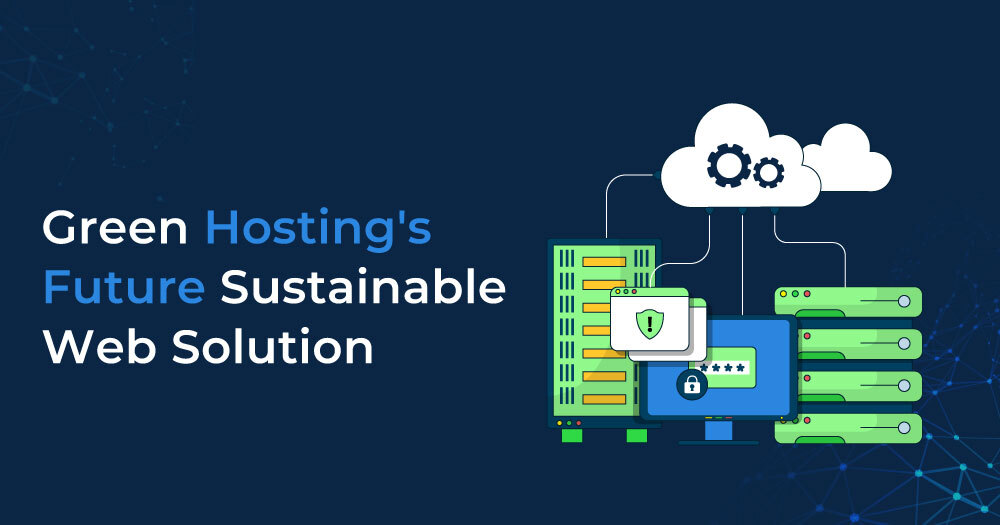The past years have demonstrated the strong connection between the digital realm and our planet’s well-being. Technologies such as AI and social media offer the potential to address issues like climate change and social-environmental concerns.
Despite the positive aspects of technological expansion, there are detrimental environmental impacts linked to increased energy consumption, leading to issues like heightened carbon emissions and electronic waste.
We stand at a critical juncture where technology can be a force for good if used responsibly. It’s imperative to ensure that our digital progress does not harm the planet. Consequently, all businesses, including web hosting firms, must collaborate to develop sustainable solutions that benefit both the environment and society. This article explores the concept of green hosting and builds a case for its adoption.
The Environmental Impact of Traditional Hosting
The environmental impact of traditional hosting is substantial, primarily due to the high electricity demands required for server operations and cooling. Traditional data centers consume significant energy, often sourced from non-renewable resources, resulting in elevated carbon emissions.
Even with conservative estimates, the data center industry’s greenhouse gas emissions are comparable to those of the airline sector, while energy consumption rivals that of entire countries such as Spain or the UK. Even seemingly minor tasks, like utilizing a PDF editor or sending emails, collectively contribute to a substantial energy demand when performed by millions of users. This underscores the importance of data centers reducing energy consumption and transitioning to more renewable sources.
As of 2012, the total electricity usage of the broader IT sector exceeded that of Russia and accounted for nearly half of the United States’ total consumption. Moreover, Greenpeace forecasts that the tech industry’s electricity usage could surge to 20% of the global total by 2025, a significant increase from the current 7%. Escalating cloud computing requirements and power-intensive technologies like AI drive this spike.
The heavy reliance on fossil fuels escalates the environmental impact, heightening greenhouse gas emissions and contributing to global warming. The environmental consequences of data centers extend beyond high electricity consumption. The considerable energy dedicated to cooling, which can consume up to 40% of a data center’s energy output, further amplifies carbon emissions, particularly in warmer regions.
In 2019, the tech sector generated 54 million metric tons of e-waste due to equipment replacement, posing additional challenges such as using hazardous cooling agents and unsustainable mining of battery components.
What Green Hosting Entails
Green web hosting aims to reduce the environmental impact of web hosting by using sustainable energy sources or offsetting emissions. Despite its importance, many companies have not adopted green measures due to decisions made by C-suite executives focused on cost rather than sustainability. These executives often default to major providers like AWS, Google, or Microsoft, benefiting from economies of scale.
However, all businesses should strive for sustainability while meeting their goals. This includes using renewable energy like solar or wind power, energy-efficient hardware, and engaging in CO2 offset activities like tree planting. At 10GB Hosting, we support sustainability by purchasing Renewable Energy Certificates (RECs) to power our operations with solar and wind energy, reducing our carbon footprint and supporting broader renewable energy initiatives.
Benefits of Green Hosting
Green hosting provides various advantages beyond just environmental friendliness. Here are key benefits of opting for green hosting:
– Reduces carbon emissions, benefiting the environment.
– Saves money for businesses through energy-efficient technologies.
– Enhances a company’s image with eco-conscious customers.
– Ensures compliance with environmental regulations to avoid penalties.
– Prepares businesses for the evolving market landscape.
– Improves website loading speed for better user experience.
– Supports sustainability, contributing to a healthier planet for all.
Emerging Trends in Green Hosting
Key trends in eco-friendly hosting mirror the web hosting industry’s move towards sustainability. These trends stem from rising awareness of digital infrastructures’ environmental impact and a growing consumer demand for green web solutions. Here is an outline of the main trends in green hosting:
Multi-Cloud and Hybrid Hosting
Companies are increasingly embracing multi-cloud and hybrid hosting strategies to enhance reliability and minimize environmental impact. These methods optimize resource utilization and efficiency by capitalizing on the scalability and flexibility of the cloud.
Containerization and Serverless Hosting
The adoption of containerized hosting and serverless architectures is on the rise, driven by their efficiency and scalability. These technologies enable precise resource allocation and utilization, reducing idle computing resources and, consequently, cutting down on energy consumption.
Carbon Offset and Neutralization
Hosting firms are actively engaging in carbon offset initiatives to neutralize their carbon emissions. This entails investing in environmental projects aimed at decreasing carbon dioxide and other greenhouse gases in the atmosphere. Some companies even exceed offsetting their carbon footprint, making a positive impact on the environment.
Conclusion
In summary, green hosting is crucial for aligning technological advancements with environmental responsibility. By adopting renewable energy, enhancing efficiency, and engaging in carbon offset initiatives, web hosting firms can reduce their environmental footprint while gaining strategic advantages like cost savings and improved corporate reputation. Embracing green hosting not only supports sustainability goals but also positions businesses at the forefront of growing market demand for eco-friendly solutions.
